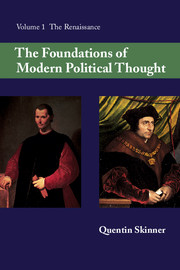Book contents
- Frontmatter
- Contents
- Preface
- Acknowledgements
- Notes on the text
- PART ONE THE ORIGINS OF THE RENAISSANCE
- PART TWO THE ITALIAN RENAISSANCE
- PART THREE THE NORTHERN RENAISSANCE
- 7 The diffusion of humanist scholarship
- 8 The reception of humanist political thought
- 9 The humanist critique of humanism
- Bibliography of primary sources
- Bibliography of secondary sources
- Index
8 - The reception of humanist political thought
Published online by Cambridge University Press: 05 June 2012
- Frontmatter
- Contents
- Preface
- Acknowledgements
- Notes on the text
- PART ONE THE ORIGINS OF THE RENAISSANCE
- PART TWO THE ITALIAN RENAISSANCE
- PART THREE THE NORTHERN RENAISSANCE
- 7 The diffusion of humanist scholarship
- 8 The reception of humanist political thought
- 9 The humanist critique of humanism
- Bibliography of primary sources
- Bibliography of secondary sources
- Index
Summary
THE HUMANISTS AS ADVISERS
As well as developing the technical aspects of Italian humanism, the northern humanists reveal the deep influence of their quattrocento predecessors in their approach to the more general problems of social and political thought. The most obvious evidence of this continuity of outlook is provided by the range of literary genres they characteristically employed. They continued to accept the well-established humanist belief that the links between sound learning and sound government are extremely close. So they continued to produce systematic educational treatises, outlining in minute detail the type of training in the studia humanitatis to be given to those who might subsequently be expected to play a leading part in the business of government. The two writers who contributed most influentially to this tradition were Sadoleto and Vives, both of whom published their major works in the early 1530s. Juan Luis Vives (1492–1540), by birth a Spanish nobleman, became Professor of the Humanities at Louvain in 1519, where he completed his book On Education in 1531 (Noreña, 1970, pp. 57–8, 116). Jacopo Sadoleto (1477–1547), a distinguished Biblical scholar as well as a prominent member of the Papal Curia, issued his somewhat similar account of The Right Education of Boys in 1534 (Douglas, 1959, pp. 14–53). Thereafter a large number of works of the same general character continued to appear throughout the sixteenth century, including such celebrated handbooks as The Schoolmaster by Roger Ascham (1515–68), who served during the 1540s as tutor to the future Queen Elizabeth.
- Type
- Chapter
- Information
- The Foundations of Modern Political Thought , pp. 213 - 243Publisher: Cambridge University PressPrint publication year: 1978



